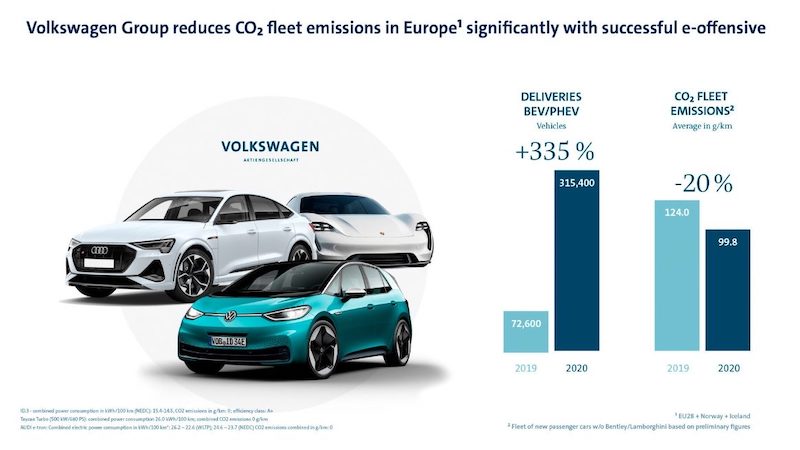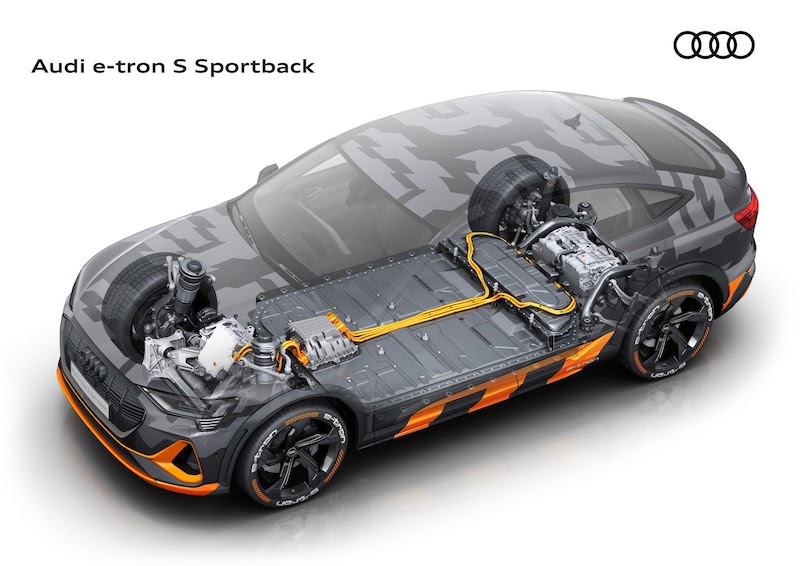Volkswagen’s electric vehicle sales have increased more than 400 percent over the past year, according to the German auto giant’s latest figures.
The Volkswagen Group says its “e-offensive is gaining traction”. Deliveries of electric models in the EU including the UK, Norway and Iceland increased “more than fourfold in the year now ended to a total of 315,400 electric vehicles (2019: 72,600)”.
The proportion of battery electric vehicles (BEVs) and plug-in-hybrids (PHEVs) in the total deliveries rose to 9.7 percent (2019: 1.7 percent).
Volkswagen says these figures now make it “the clear market leader in the all-electric segment in Western Europe”, accounting for a share of around 25 percent (2019: 14 percent).
The main drivers of this development were the Volkswagen Passenger Cars and Audi brands, which overfulfilled their CO2 fleet targets largely due to the successful start-up of their ID.31 and e-tron electric models.

Based on preliminary figures, the Volkswagen Group thus reduced the average CO2 emissions of its new passenger car fleet in the EU by around 20 percent compared with 2019 to 99.8 g/km in 2020.
The emissions of Bentley and Lamborghini are measured individually, which is why they are not included in this figure.
In anticipation of narrowly missing the target for the CO2 pool established jointly with other manufacturers by around 0.5 g/km, the Group had recognized provisions at an early stage to avoid any impact on fourth-quarter earnings.
Herbert Diess, CEO of the Volkswagen Group, says: “We are making good progress on the road to becoming a CO2-neutral company. We significantly reduced the CO2 emissions of our new vehicle fleet in the EU.
“The Volkswagen and Audi brands in particular have made a major contribution to achieving this with their e-offensive. We narrowly missed the fleet target for 2020, thwarted by the Covid-19 pandemic.
“Along with Volkswagen Passenger Cars and Audi, CUPRA and ŠKODA are now bringing out further attractive electric models. This will allow us to achieve our fleet target this year.”
Rebecca Harms, member of the independent Volkswagen Sustainability Council, says: “Despite very ambitious efforts in electrification, it has not been possible to meet the set fleet target in full.
“But Volkswagen is clearly well on its way. Work has to continue systematically to bring about the drive transformation and meet climate and sustainability targets. The key to success will be to give a greater role to smaller, efficient and affordable models in the electrification rollout.”
Volkswagen Passenger Cars was the first Group brand to deliver all-electric vehicles based on the Modular Electric Drive Toolkit (MEB) to customers in 2020. Launched in September, the ID.3 has enjoyed great demand from customers, with 56,500 vehicles already handed over by the end of the year.
A total of around 212,000 electric Volkswagen vehicles were transferred to customers in the past year, including around 134,000 BEVs. This means that the brand significantly overfulfilled its CO2 fleet target and made a considerable positive contribution to the Group.
The Audi brand also came within its CO2 fleet target in 2020 and contributed positively to the Group. The brand continues its transformation into a provider of sustainable premium mobility; last year it was by far the largest manufacturer of electric vehicles among the three German premium brands.
The successful Audi e-tron model (including the Audi e-tron Sportback) recorded a “significant increase” in demand in the past year, with year-on-year growth of 79.5 percent (47,300 vehicles). Worldwide, the Audi e-tron is the best-selling electric vehicle among German premium manufacturers.
The Volkswagen Group will systematically step up its e-offensive in 2021 with a large number of new all-electric vehicles based on the Modular Electric Drive Toolkit (MEB).
Audi will start this year with the Q4 e-tron2 and Q4 e-tron Sportback2, CUPRA will launch the el-Born2 and ŠKODA will bring the Enyaq iV3 to its customers. Volkswagen Passenger Cars will launch the ID.44 in in a number of additional markets and present a new all-electric model.
The Volkswagen Group, together with other manufacturers, has launched a CO2 pool for passenger car registrations in the European Union. Based on preliminary figures, this pool achieved average CO2 emissions of 99.3 g/km, thus narrowly missing its target by around 0.5 g/km. The final confirmation by the EU Commission is to follow at a later date.
Volkswagen is the first automotive group to commit to the Paris Climate Agreement and intends to become climate-neutral by 2050.
The Group aims to become the leading provider of electric vehicles worldwide by 2025. Until then, around €35 billion of investments are therefore planned in e-mobility and another amount of around €11 billion in the hybridization of the model portfolio.
The Group is planning to sell around 26 million battery electric vehicles by 2030. Around 19 million of these vehicles will be based on the Modular Electric Drive Toolkit (MEB), while most of the remaining 7 million vehicles will be based on the High Performance Platform (PPE).
The Group expects around 7 million hybrid vehicles in the same period. These plans do not yet incorporate potential future requirements under the EU’s Green Deal.

